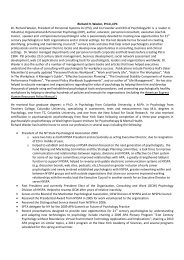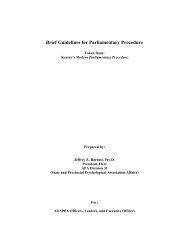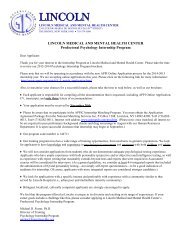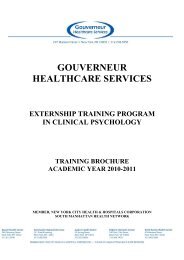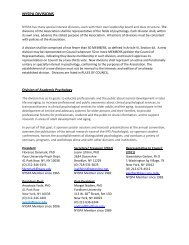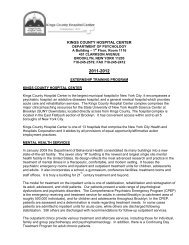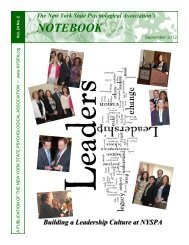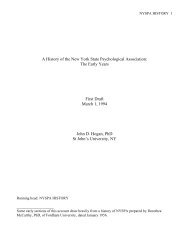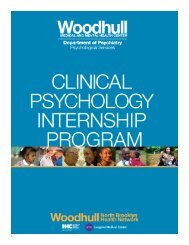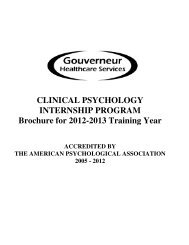2011 ⢠NYS Psychologist - New York State Psychological Association
2011 ⢠NYS Psychologist - New York State Psychological Association
2011 ⢠NYS Psychologist - New York State Psychological Association
You also want an ePaper? Increase the reach of your titles
YUMPU automatically turns print PDFs into web optimized ePapers that Google loves.
Exploring Human Sexuality for<br />
Women with Intellectual Disabilities<br />
Sharon M. McLennon, MSEd., CRC, LMHC<br />
Laura Palmer, PhD<br />
This literary review will focus on discussing the significance of<br />
sexuality, intimacy, and establishment of meaningful relationships<br />
for women with intellectual disabilities. Women with intellectual<br />
disabilities should have the same individual rights in this country,<br />
including having access to health information about their sexual<br />
reproductive system. Knowing about the inner workings of their<br />
reproductive organs, the ways that sexually transmitted diseases<br />
are spread, information regarding sexual intercourse, and responsibilities<br />
and procedures regarding the use of birth control are<br />
critical to their health and safety. This article will present the challenges<br />
that women with intellectual disabilities might encounter<br />
when exploring their sexuality. Treatment recommendations will<br />
be discuss to assist those professionals who work with this population.<br />
Key Words: women; sexuality; intimacy; intellectual disabilities;<br />
reproductive health; marginalized group<br />
INTRODUCTION<br />
As human beings, we try to evaluate our individual purpose and<br />
meaning for our existence. This task could be accomplished by finding<br />
satisfaction in one’s occupational choices, having and raising<br />
children, maintaining loving relationships with significant others and<br />
family members, etc. For most people, the satisfaction in life could<br />
be defined by the quality of their loving relationships. Many individuals<br />
depend on these relationships with significant others to bring<br />
them romantic comfort, companionship, intellectual stimulation, sexual<br />
satisfaction and a sense of connection. A healthy sexual identity<br />
contributes to a person’s sense of individual worth and their sense of<br />
being valued and appreciated in their romantic relationships.<br />
It was stated by Vansteenwegen, Jans and Revell (2003) that<br />
a woman with a disability can experience difficulties in demonstrating<br />
her sexuality and having sexual satisfaction due to the<br />
implications of her disability as well as societal view on the impact<br />
of the disability. Their research ascertained that approximately<br />
95% of individuals without disabilities are engaging in sexual activity.<br />
When examining the same statistics pertaining to individuals<br />
with disabilities, only 50% of Individuals with Disabilities are sexually<br />
active. Obviously, there is an issue of definition and degree<br />
of disability to be considered when exploring the importance of<br />
sexuality to one’s sense of identity. All people are biologically created<br />
for their sexuality, including those who have disabilities.<br />
Sweeney (2007), Anderson (2000), and Heyman & Huckle<br />
(1995) suggested that parents of a person with an intellectual<br />
disability (ID) might have some preconceived notions that might<br />
include the following stereotypic thoughts:<br />
1. People with ID are childlike in nature, or even considered<br />
perpetual children and not true sexual beings like their peers<br />
without disabilities.<br />
2. People with ID do not really view their sexuality as a critical<br />
issue in their life.<br />
3. People with ID are not given the same credence like their non<br />
-disabled peers when considering their sexual expression.<br />
4. People with ID are considered asexual.<br />
5. People with ID are sexually impulsive.<br />
6. People with ID are not fully responsible for their sexual behaviors<br />
and, if taught about it, might sexually act out.<br />
7. Bodies of people who have ID do not sexually mature like<br />
their counterparts without disabilities.<br />
8. People with ID would be unable to fully or partially comprehend<br />
cultural rules regarding acceptable, public, sexual behavior.<br />
9. People with ID would be unable to deal with or tolerate the<br />
complexities of sexual relationships.<br />
10. People with ID overall, would not be accepted by society in a<br />
sexual relationship.<br />
These present preconceived notions regarding women with<br />
ID are damaging and further cause the transfer of incorrect sexual<br />
knowledge for this referent group.<br />
HISTORICAL OVERVIEW<br />
American history demonstrates a very difficult sexual development<br />
and exploration period for women with ID. This troublesome time in<br />
American culture was known as the Eugenics Movement. According<br />
to Landman (1932) eugenics is defined as “A science of human<br />
betterment. It is concerned with the study of being wellborn<br />
______________________________________________<br />
Sharon Melisse McLennon, MSEd., CRC, LMHC has been a Certified<br />
Rehabilitation Counselor for over 13 years and is a <strong>New</strong> <strong>York</strong> <strong>State</strong> licensed<br />
Mental Health Counselor. She is a Rehabilitation Consultant at the<br />
Shield Institute for Clinical Services in Bayside, <strong>New</strong> <strong>York</strong> where she<br />
works with individuals with intellectual disabilities. She is a fifth-year doctoral<br />
candidate in the Counseling Psychology program At Seton Hall University<br />
in South Orange, <strong>New</strong> Jersey. Ms. McLennon’s research areas<br />
include disability and sexuality. She wrote an article titled “The Pursuit of<br />
Happiness: the Aspect of Disability in Graduate Education” published in<br />
the <strong>New</strong> Jersey <strong>Psychologist</strong> in 2007. Ms. McLennon has received numerous<br />
awards for her research endeavors and academic scholarship including<br />
the American <strong>Psychological</strong> <strong>Association</strong>’s Division 22, Rehabilitation<br />
Psychology, Research Poster Award of the Year for her research on employment<br />
needs for persons with Traumatic Brain Injury presented at the<br />
San Diego annual convention in 2010, the graduate education award from<br />
the Lighthouse International and from the American Council for the Blind<br />
in 2008.<br />
Laura Palmer, Ph.D. is an Associate Professor in the department of<br />
Counseling Psychology at Seton Hall University in South Orange, <strong>New</strong><br />
Jersey. Dr. Palmer is the chair of the Professional Psychology and Family<br />
Therapy Department and Training Director of the doctoral program in<br />
Counseling Psychology in the College of Education and Human Services<br />
at Seton Hall University. She maintains a private practice where she works<br />
with children and elderly adults. Dr. Palmer’s research interest is in the<br />
areas of neuropsychology, sexual abuse and trauma.<br />
Page 13<br />
Vol. XXIII No. 2 • Fall <strong>2011</strong> • <strong>NYS</strong> <strong>Psychologist</strong>



